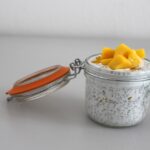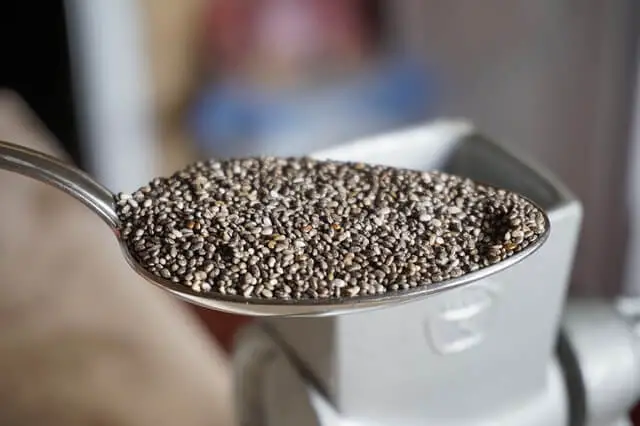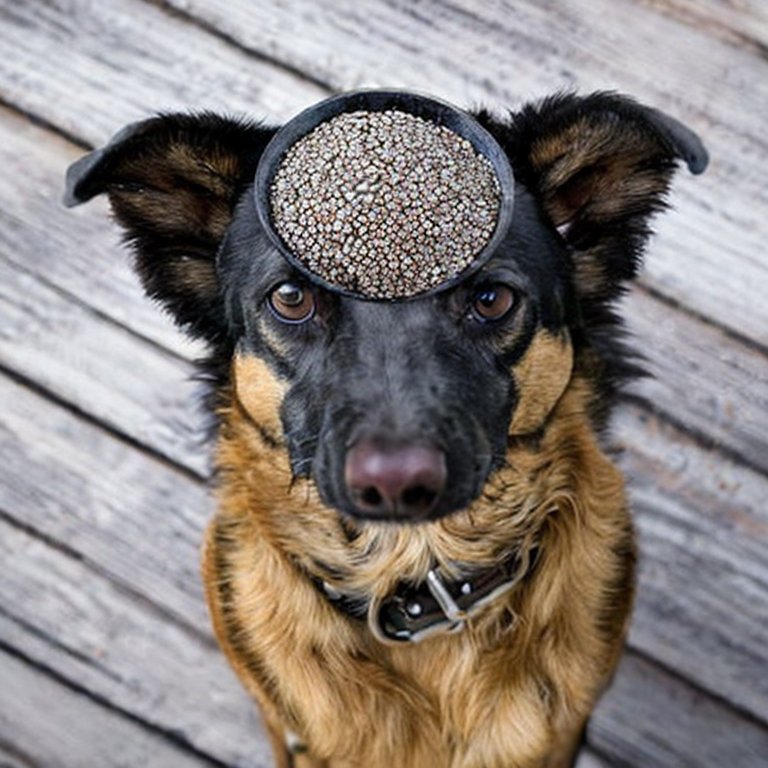
Chia seeds may offer a range of potential health benefits for dogs, including support for digestive health, healthy skin and coat, and protection against chronic diseases. They are easy to give to your dog or to incorporate into their current foods.
- What are Chia Seeds?
- Can Dogs Eat Chia Seeds?
- Chia Seed Benefits for Dogs
- Are Chia Seeds Safe for Dogs?
- How to Add Chia Seeds to Your Dog’s Diet
- How to Prepare Chia Seeds for Dogs
- Should I Soak Chia Seeds Before Giving them to My Dog?
- Can Dogs Eat Chia Seeds Every Day?
- Special Circumstances
- Final Thoughts
What are Chia Seeds?
Chia seeds are a type of small, black seed that is native to Mexico and Central America. They are known for their high fiber and nutrient content and are often used as a dietary supplement for humans. (See the Benefits of Chia Seeds) The good thing is chia seeds may also be beneficial for dogs and can be safely included in their diet in small amounts.
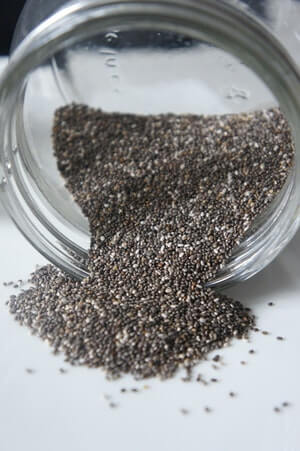
Can Dogs Eat Chia Seeds?
Chia seeds may also be safely consumed by dogs in small to moderate amounts. Chia seeds have tremendous health benefits for humans, and can be just as nutritious for your dog.
However, chia seeds are also high in calcium, which may be problematic for dogs with certain health conditions, such as kidney disease or bladder stones. If your dog has a health condition, or you are uncertain, it is a good idea to consult with a veterinarian before adding chia seeds to your dog’s diet first, as they may interfere with certain medications or have other interactions with your dog’s health.
Chia Seed Benefits for Dogs
Chia seeds may also offer a range of potential health benefits for dogs and can be safely included in their diet in small amounts.
Here are some of the potential benefits of chia seeds for dogs:
- High fiber content: Chia seeds are a good source of fiber, which can help to support digestive health and prevent constipation.
- Omega-3 fatty acids: Chia seeds are a good source of omega-3 fatty acids, which may help to reduce inflammation and support healthy skin and coat.
- Antioxidants: Chia seeds are rich in antioxidants, which may help to protect against chronic diseases and promote overall health.
- Weight management: Because chia seeds are high in fiber, they may help to promote feelings of fullness and prevent overeating, which may be beneficial for dogs that are overweight or obese.
Are Chia Seeds Safe for Dogs?
Chia seeds are generally considered to be safe for dogs when consumed in appropriate amounts. However, like any new food, it’s important to introduce chia seeds to your dog’s diet gradually and in small quantities to give their digestive system time to adjust.

It’s also important to remember that chia seeds should only be given to your dog as an occasional treat or supplement and should not replace their regular diet. A balanced diet that includes high-quality protein sources, vegetables, and whole grains is essential for your dog’s overall health and well-being.
How to Add Chia Seeds to Your Dog’s Diet
It is important to note that chia seeds should be given to dogs in moderation, as they can be high in calories and may cause digestive upset if fed in large amounts. Chia seeds are also high in calcium, which may be problematic for dogs with certain health conditions, such as kidney disease or bladder stones. It is a good idea to consult with a veterinarian before adding chia seeds to your dog’s diet, as they may interfere with certain medications or have other interactions with your dog’s health.
To feed chia seeds to your dog, you can sprinkle a small amount (about 1/4 teaspoon) on their food or mix it into their water. Chia seeds can also be mixed into homemade dog treats or added to homemade dog food recipes.
An even better option, just as with humans, is to soak and prepare the chia seeds first.
How to Prepare Chia Seeds for Dogs
By preparing chia seeds properly you can ensure that they are safe and more digestible for your dog. Here are some steps you can follow to prepare chia seeds for your dog:
- Start by purchasing high-quality chia seeds. Look for seeds that are organic and free of additives or preservatives.
- Before serving the seeds to your dog, it’s a good idea to soak them in water for a few hours or overnight. This will help soften the seeds and make them easier to digest.
- Once the seeds are fully soaked, drain off any excess water and mix them into your dog’s food. You can also mix the seeds with a small amount of water to make a paste, which can be used as a topping for your dog’s food or as a treat.
- It’s important to remember that chia seeds should only be given to your dog in small quantities. A general guideline is to offer no more than 1 teaspoon per 20 pounds of body weight per day.
- If you are introducing chia seeds to your dog’s diet for the first time, start with a small amount and gradually increase the quantity over a few days to give your dog’s digestive system time to adjust.
By following these steps, you can safely and effectively incorporate chia seeds into your dog’s diet.
It is important to monitor your dog’s response to chia seeds and adjust the amount accordingly to ensure that they are receiving the appropriate amount for their size and needs.
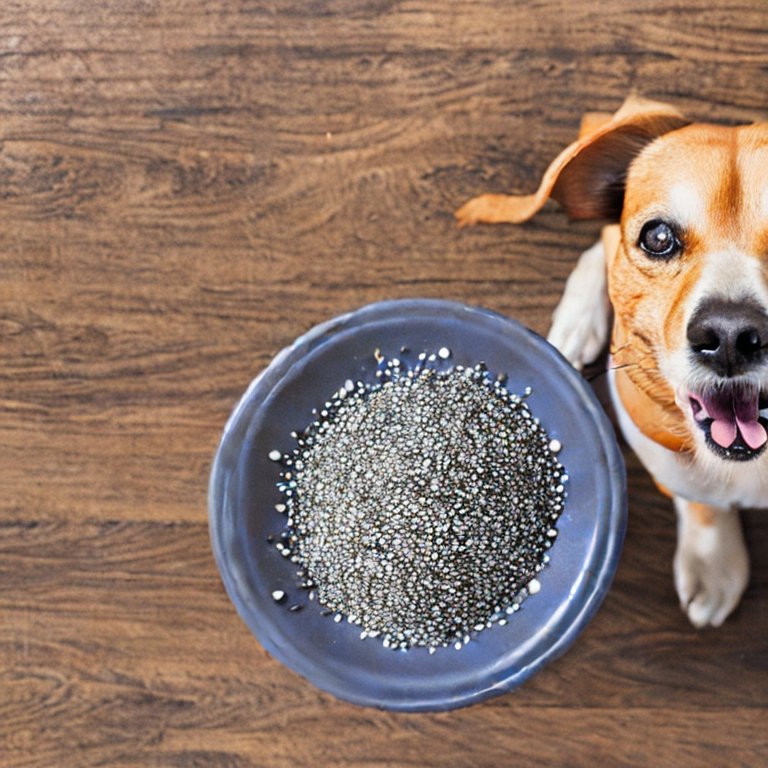
When shopping for chia seeds for your dog, it is important to choose a high-quality brand that uses whole, minimally processed seeds and has a good reputation. It is also a good idea to read the label and choose a brand that is free from additives or artificial ingredients that may not be desirable or healthy for your dog.
Should I Soak Chia Seeds Before Giving them to My Dog?
It is generally recommended to soak chia seeds before giving them to your dog. Soaking the seeds helps to soften them, which can make them easier for your dog to digest. In addition, soaking the seeds can help to activate some of the nutrients and make them more bioavailable to your dog.
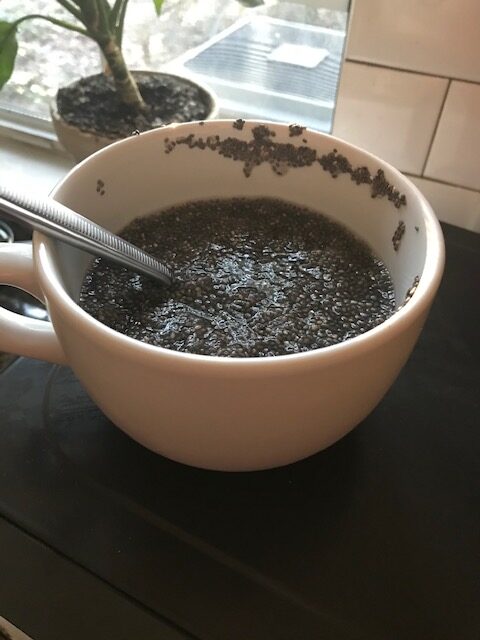
To soak chia seeds, simply add them to a small bowl or container and cover them with water. Let them sit for a few hours or overnight, then drain off any excess water before mixing the seeds into your dog’s food.
Can Dogs Eat Chia Seeds Every Day?
Dogs can eat chia seeds every day in moderation. A general guideline is to offer no more than 1 teaspoon per 20 pounds of body weight per day.
It’s also important to remember that chia seeds should only be given as an occasional treat or supplement and should not replace your dog’s regular diet. A balanced diet that includes high-quality protein sources, vegetables, and whole grains is essential for your dog’s overall health and well-being.
Special Circumstances
Chia Seeds for Dogs with Allergies
Chia seeds can be a nutritious and healthy addition to a dog’s diet, as they are high in fiber, protein, and essential fatty acids. However, if your dog has allergies, it’s important to exercise caution when introducing chia seeds to their diet.
Before giving chia seeds to a dog with allergies, it’s a good idea to consult with your veterinarian. Your vet can help you determine if chia seeds are appropriate for your dog based on their specific allergies and overall health.
If your vet gives you the green light to try chia seeds, it’s important to start with a small amount and gradually increase the quantity over a few days to give your dog’s digestive system time to adjust. You should also be on the lookout for any allergic reactions, such as scratching, sneezing, or swelling, and stop giving your dog the seeds if you notice any adverse reactions.
It’s also a good idea to purchase high-quality, organic chia seeds to reduce the risk of your dog reacting to any additives or preservatives.
Chia Seeds for Dogs with Kidney Disease
If your dog has kidney disease, it’s important to exercise caution when introducing chia seeds to their diet.
Kidney disease is a serious condition that requires careful management and a special diet to help support kidney function and prevent further damage. If your dog has kidney disease, it’s essential to work closely with your veterinarian and follow their recommendations for your dog’s diet and nutrition.
While chia seeds may have some potential health benefits, they should be used with caution in dogs with kidney disease. The high fiber and protein content of chia seeds may put additional strain on the kidneys and may not be appropriate for all dogs with kidney disease.
If you are considering adding chia seeds to your dog’s diet and they have kidney disease, it’s important to consult with your veterinarian first. Your vet can help you determine if chia seeds are appropriate for your dog based on their specific condition and overall health.
Remember, the most important thing is to follow your veterinarian’s recommendations and provide your dog with a well-balanced diet that meets their specific nutritional needs.
What If My Dog Has Diarrhea?
Chia seeds are generally safe in moderation, but if your dog consumes too many chia seeds, it could lead to digestive issues, such as diarrhea.
If you notice that your dog is experiencing diarrhea after consuming chia seeds, stop giving them the seeds and consult with your veterinarian. Your vet can help determine the cause of the diarrhea and recommend the appropriate course of treatment.
In general, it’s a good idea to monitor your dog’s diet and be mindful of any new foods or treats that you introduce to their diet. If you notice any changes in your dog’s behavior or health, it’s always a good idea to consult with your veterinarian.
Final Thoughts
Chia seeds may offer a range of potential health benefits for dogs, including support for digestive health, healthy skin and coat, and protection against chronic diseases. They are highly versatile and can be easily incorporated into a variety of dishes.
However, it is important to feed chia seeds to dogs in moderation and may be wise to consult with a veterinarian before adding them to your dog’s diet. When shopping for chia seeds, be sure to choose a high-quality brand that is free from additives or artificial ingredients.
Lance has been passionate about the plant-based diet and we have been following a whole food plant-based diet for over 5 years. We focus on health, natural healing, weight management, animal rights, and the health of the planet and environment by focusing on whole plant-based foods and sustainable practices.
Learn more at the About Me page and follow on social media at the links below.



